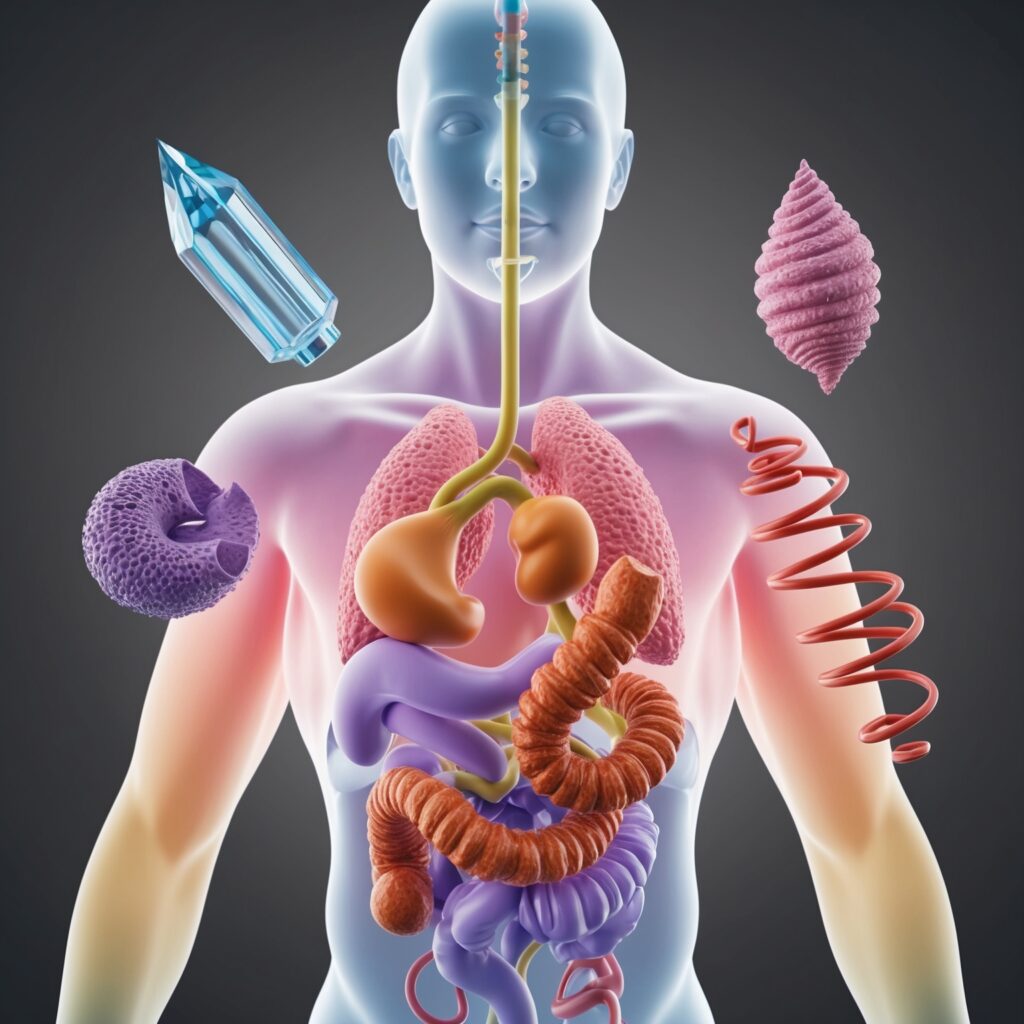Disclosure:
Thank you for reading this post, don't forget to subscribe!
Some of the links on this website are affiliate links. This means that if you click on the link and make a purchase, we may receive a small commission at no extra cost to you. Your support helps us keep the site running.Learn more on my Privacy Policy and Affiliate Disclosure page. Thank you for your support!

Hormones are like the body’s secret agents, quietly controlling countless functions we often take for granted. Imagine them as text messages being sent from one part of the body to another, getting things done without making a fuss. Originating from glands like the pituitary, thyroid, and adrenal glands, hormones are tiny powerhouses fueling growth, metabolism, and mood.
These little messengers travel through the bloodstream, hitting up various organs and tissues with their orders. They ensure everything runs smoothly, whether it’s turning food into energy, triggering puberty changes, or even managing stress levels. Without them, our body’s intricate operations would be in chaos!
check out: Resolving Common Health Problems: Tips, Treatments, and Prevention-Resolving common health problems is essential for improving your overall well-being.
It’s pretty crazy how something so small can have such a massive impact. Any glitch in hormonal balance can send ripples throughout the body, affecting overall health, mood, and even our daily energy levels. Whether it’s a surge or a drop, those changes might be subtle, like a bad hair day, or substantial enough to need medical attention.
Keeping an eye on these messengers isn’t always straightforward, but the key is recognizing changes in your body. Understanding hormones empowers us to stay on top of our health. Partner up with healthcare pros whenever something feel
read next:
- Gut Health Decoded: How Your Microbiome Shapes Energy, Mood, and Immunity
- The Science of Stillness: How Doing Nothing Can Heal Your Mind and Body
- Are You a Late-Night Snacker? 5 Possible Reasons Why You Can’t Stop Craving Food at Night
The Impact of Hormones on Physical Health
Hormones play a significant role in keeping our physical health in check. Think of them as the body’s maintenance crew, ensuring that everything is running smoothly. One of their major gigs is managing metabolism, which is all about how our bodies convert food into energy. When hormones like insulin or thyroid go a bit wonky, it can lead to issues like weight gain, fatigue, and even diabetes.
Growth and development, both during childhood and later in life, are hugely influenced by hormones. Hormones like growth hormone and thyroxine guide developments from height increase to muscle growth. Without them, growth can stall, and developmental disorders might pop up.
find out more about: Endocrine Society: How Hormones Affect Your Body-Hormones are are the body’s chemical messengers, sending signals into the bloodstream and tissues.
Then there’s the whole reproductive health scene. Hormones are pivotal in everything from menstrual cycles to fertility. These are not just female concerns; testosterone and other hormones play essential roles in male reproductive health too. Disruptions here can lead to challenges ranging from irregular periods to difficulties in conceiving.
The immune system also gets its cues from hormones. Cortisol, often dubbed the stress hormone, affects how our body handles stress and inflammation. If cortisol levels are too high or too low, it might leave us more vulnerable to infections or feeling run down.
Keeping tabs on these aspects is crucial, and a balanced lifestyle supports hormonal health in all these areas. When in doubt, consult healthcare professionals. They can provide guidance on maintaining healthy hormone levels and offer solutions when things go awry.

Hormones and Mental Health: A Complex Relationship
Hormones aren’t just about physical health; they’ve got a big say in our mental health too. These tiny agents influence how we feel, react, and even think. Ever notice mood swings during puberty or stress? That’s hormones at work.
One key player here is cortisol, often called the stress hormone. In short bursts, it’s helpful, like when you’re facing a ‘fight or flight’ situation. But constant stress floods the body with cortisol, which ain’t so great for the mind, leading to anxiety and possibly even depression.
learn more about: Hormonal Much? How Hormones Affect Your Body–Learn how exercise, sleep, and even snuggling can keep your hormones balanced.
Then there’s serotonin, known to affect mood, social behavior, and sleep, and guess what? Hormones help regulate its levels. Fluctuations can make us feel upbeat one moment and gloomy the next.
Thyroid hormones also can heavily impact mental state. An overactive or underactive thyroid can mess with energy levels and leave you feeling jittery or exhausted, often manifesting as irritability or lethargy.
It’s essential to pay attention to these mental signs and not just brush them off as ‘bad moods’. Keep an eye on how you’re feeling day-to-day. If symptoms persist, reach out to healthcare professionals for a deeper look into what’s going on hormonally.
Balancing mental health involves recognizing the powerful role of hormones. They hold more sway over our thoughts and feelings than we might realize. A holistic approach that includes healthcare guidance, lifestyle adjustments, and sometimes medication can make a world of difference.
Hormonal Changes Across Different Life Stages
Our bodies are constantly changing and evolving, and hormones are at the heart of these transformations. Puberty is often the first major wave of hormonal changes people experience, setting off a cascade of developments. It’s when these hormones kickstart growth spurts, voice changes, and, well, a rollercoaster of emotions.
Pregnancy takes hormonal shifts to another level. During this time, the body is in overdrive, producing more hormones like estrogen and progesterone to support the developing baby. These fluctuations not only prepare the body for childbirth but can also bring about mood swings and fatigue.
Read more about: WebMD: Understanding Hormonal Imbalances-Your Hormones, Your Health This article offers further insights into what causes hormonal imbalances and how they affect your health.
For many, menopause marks a significant shift in hormones, notably the decline of estrogen. This can lead to symptoms like hot flashes, night sweats, and mood changes. On the flip side, men go through andropause, where hormone levels, particularly testosterone, start to decline, affecting energy and mood.
Aging affects everyone differently, but hormonal changes are a common thread. As we get older, many experience a gradual decline in various hormones, impacting everything from metabolism to sleep patterns. Understanding these changes can help manage expectations and support healthier aging.
Navigating these stages successfully often requires a proactive approach. Regular checks with healthcare providers can ensure your hormones are where they need to be. Don’t shy away from discussing the physical and emotional changes with a professional who can offer tested advice or solutions.
Lifestyle Factors and Hormonal Balance
The way we live day-to-day has a big impact on our hormonal health. Believe it or not, what we eat can either support or disrupt our hormones. Foods rich in essential fatty acids, protein, and vitamins help keep our hormones happy. Meanwhile, excessive sugar and processed foods can send them haywire.
Exercise isn’t just for fitness enthusiasts; it’s a natural hormone booster for everyone. Physical activity encourages the production of endorphins and can help regulate hormones like insulin. Keeping active is one of the simplest ways to stay balanced.
Getting enough quality sleep is like hitting the reset button for hormones each night. Sleep deprivation messes with hormones like ghrelin and leptin, which control hunger and satiety, making it tough to manage cravings and weight.
discover: How To Create A Meal Plan For Optimal Health-Balanced nutrition plays a huge role in overall wellness It can have a big impact on your mental well-being too.
Let’s not forget the impact of stress. Managing stress is crucial to maintaining hormonal harmony. Techniques like meditation, yoga, or even just taking time for leisure activities can lower cortisol levels, easing tension in both mind and body.
Recognizing how intertwined lifestyle and hormones are puts the power in your hands. Simple changes can really make a difference. If something feels off despite these efforts, consulting a healthcare professional is a smart move to pinpoint any deeper issues.
Seek help if you notice persistent symptoms that disrupt your daily life. Professionals offer expertise to navigate these conditions, ensuring that you’re not just masking symptoms but addressing any root causes.
EXPLORE MORE FROM MORNINGSCAPE MINDSET MEDIA:
- The Science of Stillness: How Doing Nothing Can Heal Your Mind and Body
- The Ultimate Fat-Loss + Muscle Retention Blueprint (For Men)
- Smart Biceps Training: A Science-Backed Blueprint for Bigger, Stronger Arms
- Manifestation Myths: What the Law of Attraction Gets Wrong (and Right)
- Cassava 101: Nutrition, Benefits, and How to Add It to Your Diet
Recognizing Hormonal Imbalances and When to Seek Help
Spotting the signs of hormonal imbalances early can save a lot of hassle down the road. Symptoms like unexplained weight gain, fatigue, or mood swings might often get shrugged off but could actually be signals that your hormones are out of whack.
Common disorders, like polycystic ovary syndrome (PCOS) or thyroid problems, show up with distinct symptoms such as irregular periods or noticeable changes in skin and hair. These symptoms offer clues that something more than everyday stress might be at play.
Testing is typically straightforward, involving blood tests to check hormone levels. It’s a step towards understanding if there’s a deeper issue behind unexplained changes in mood, energy, or weight.
Treatment options vary depending on the specific imbalance. It could be lifestyle tweaks, hormone replacement therapy, or medications. What’s important is to follow a plan that’s suited to your needs, ideally developed with a healthcare professional.
Leveraging Resources for Hormonal Health
Finding trustworthy information is crucial when navigating hormonal health. Begin with reputable sources, like health websites from established institutions and healthcare providers. These can provide evidence-based insights into hormone functions and common issues.
Internal resources, like related articles, can deepen your understanding by highlighting how hormones interact with other body systems. For instance, exploring articles that discuss nutrition in detail can offer practical dietary advice to support hormone balance.
Look to external studies from trusted networks, like scientific journals, for the latest research on hormonal therapies or novel approaches to balancing hormones. These resources keep you updated on breakthroughs that might benefit your health strategy.
Consider community support groups, whether online or in-person, where you can connect with others experiencing similar issues. Sharing experiences and tips can be incredibly supportive and reassuring.
Taking the step to learn more about hormones puts you in control. Keep in touch with professionals who can offer personalized advice tailored to your unique hormonal needs.
more about:
HEALTH / WELLNESS / FITNESS / NUTRITION
share this article







